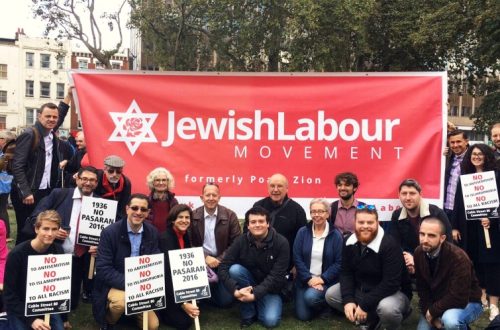By Harry Storm

Christmas is closing in on us, and here in Canada we’ll be hearing the usual retinue of Christmas music on the radio and in shopping malls weeks before Americans do, as they sensibly wait until their Thanksgiving is over before turning on the Yuletide tunes. Personally, I’ve always liked a lot of Christmas music, even if it’s overplayed. One of my favourite tunes is the diminutive belter Brenda Lee’s Rockin’ Around the Christmas Tree, which includes the line “everyone dancing merrily in the new old fashioned way.”
Antisemitism today is just like Brenda Lee’s description of dancing at Christmas. The protests against Israel that included rationales and even exclamations of support for Hamas’ actions by large swathes of the far left and the Muslim world in reaction to the massacre of 1,400 innocents in southern Israel on October 7 by Hamas terrorists, and the instant and hysterical blaming of Israel for bombing a hospital without any evidence by many on the not-so-far-left and others is evidence of a persistent animus toward Israel – and by extension the vast majority of Jews who support it. These people single out the Jewish state and never give it the benefit of the doubt.
So what appears on the surface to be a “new” kind of antisemitism turns out to be simply a different rationale for the same old-fashioned demonisation of Jewish people. And it’s not the first time this hatred has changed its outward appearance but retained its core characteristic: hatred of Jews.
In pre-Christian days, Jews were hated as a “people apart” in the Hellenistic world. According to G.S. Sloyan, professor emeritus of Religion at Temple University, “Jews were thought to be people that dressed differently and, in Palestine, spoke in a strange tongue; although outside Palestine, they spoke Greek like the rest. They were labeled atheists because they did not believe in any of the Graeco-Roman gods or goddesses. Worse still, they were called “enemies of the human race” because they did not eat the foods that others did or mingle with them in gymnastics, the theater, race courses, or similar social pursuits.” Nonetheless, Sloyan notes, many Hellenistic haters grudgingly admired the Jews for their love of learning.
The advent of Christianity in the Greco-Roman world and neighbouring countries gave Jew-hatred an outward religious form. Christians believed that Jews were Christ-killers and that their descendants bore the guilt of Jesus’ crucifixation. But although Christian actions against Jews, such as expulsions or selling them into slavery, appear superficially to be inspired by religious belief, “all such expulsions and persecutions [were] dependent on other factors such as politics, xenophobia, and scapegoating.” (Sloyan) This is perhaps best illustrated by the fate of conversos in Spain (Jews who converted to Christianity), who learned via the Inquisition that conversion did not give them freedom from anti-Jewish animus.
Soon after the emancipation of Jews in France in 1791 by the National Assembly, a new anti-Jewish hate came into being. Based on so-called “race,” this manifestation of Jew hatred led one of its more rabid practitioners to coin the term antisemitism (meant as a positive attribute) and was enthusiastically embraced by much of Western Europe, especially in France and the principalities that would join together and by 1871 create the German Empire. This racial antisemitism festered in Germany until Hitler came to power, with genocidal results for the Jews of Europe, particularly in eastern Europe, where it fanned the existing religion-based antisemitism so prevalent there. The combination of racial and religious antisemitism was the reason so many of the worst excesses of the Holocaust were carried out by Ukrainians, Lithuanians, Latvians, Poles, Slovaks, Croatians, and other eastern European nationalities, mostly in service of their German Nazi overlords, and sometimes independently.
After Germany was defeated and horrors of the Holocaust became known, expressions of overt hatred of Jews were mostly muted, and antisemitism seemed, in the West at least, to be a relic of the past, albeit the very recent past. This is certainly what the baby boom generation was brought up to believe.
But things began to change after the state of Israel, established in 1948, won a massive victory in 1967 over three Arab armies whose intention was to defeat Israel and annihilate the Jewish presence in “Palestine.” Much of the left, which had enthusiastically supported the creation of Israel after the holocaust, could not tolerate a Jewish state that dominated its neighbours militarily, even if this was clearly a necessary precondition for its survival in a hostile environment.
Rage filled anti-“Zionist” demonstrations began to occur at university campuses and articles expressing what can only be called loathing of Israel and its Jewish supporters appeared in student newspapers and some academic journals. Suddenly Israel the plucky underdog became Israel the ethnic cleansing coloniser state. The “social justice” so avidly promoted by wide swathes of the left applied not to the Jewish state but to its “victims,” the Palestinians. The Jews of Israel – and by extension, their Jewish supporters — were branded as oppressors and racists: In 1975 the UN general assembly, which had voted a Jewish state into being in 1947, even passed a resolution stating that “Zionism is racism” with a large majority.
Leftists critical of Israel shrugged off accusations of antisemitism. Anti-zionism wasn’t anti-Jewish, they said. “Look, some of our most rabid anti-zionists are Jewish,” unaware or uncaring about the irony, however unwitting. Jews who had survived the vicious racial antisemitism in Europe, including both my holocaust survivor parents, warned that antisemitism had not really gone away. They said anti-zionism was just antisemitism in a different guise, but most Jewish baby boomers, brought up in liberal democratic countries with little personal experience of in-your-face Jew-hatred, generally overlooked anti-zionism or even believed the anti-zionists made some valid points.
The more recent embrace of identity politics by far leftists and most liberals has provided yet another rationale for attacks not only on Israel but on Jews generally, ostensibly on the basis of privilege. On the “oppression ladder,” Jews are pretty much at the bottom, despite their history of persecution and the unprecedented genocide fewer than 80 years ago. Most Jews in the West are white (strike 1); successful (strike 2), and support Israel, which, according to many extreme and not-so-extreme leftists, is a coloniser that oppresses brown people (strike 3). This provides the intellectual veneer for another manifestation of Jew hatred.
Older Jews, like my father-in-law, who grew up in apartheid South Africa and enjoyed a life of relative privilege, nevertheless grew up in the shadow of the holocaust and saw the signs. One evening around the dinner table, on hearing the news of yet another atrocity by Palestinian terrorists during the second intifada that killed scores of Jewish Israelis and seeing the ho-hum reaction (at best) in the Western press and academe, this artistic, well-educated, and sophisticated man, stated simply, “the world just doesn’t like Jews.”
It pains me to say that events since then have only proven him and my parents 100% correct. After Hamas terrorists slaughtered entire families, children in front of their parents, parents in front of their children, and teens and young adults attending a music festival for “peace,” there was much sympathy and qualified support for Israel and Jews generally, but that lasted only until Israel began to retaliate, at which point many joined the radical fringe to denounce Israel’s “genocidal” campaign of “ethnic cleansing” against Palestinians. Meanwhile the far left, which prevails on college campuses and increasingly in media and other social and cultural institutions, blamed Israel for the slaughter of its own citizens even while the blood of the victims was still drying.
As the death toll in Gaza began to mount, there was an almost a palpable sense of relief among all too many that the stick with which they could yet again beat Israel with had arrived at last. The same old rationalisations for barbarous anti-Semitic behavior by Hamas were trotted out, followed by the same old denunciations after Israel took action to rid itself of Hamas once and for all.
Left anti-Semites who deny or rationalise Palestinian atrocities against Jews are no different than right-wing anti-semites who deny the holocaust, only they have many more apologists among the wider left than holocaust deniers do among the right. The leftist tendency to defend atrocities by Palestinians is reminiscent of the soft spot that much, but not all, of the left, had for the Communists in the Soviet Union and China and their reluctance to denounce their crimes against their own people and others. But their defence of Palestinian atrocities is more visceral and extreme, because of antisemitism, whether conscious or subconsciously absorbed living in a culture steeped in 18 centuries of anti-Jewish animus.
Canadian columnist Rex Murphy, writing in 2021 during another Hamas-initiated exchange with Israel, wrote something that is even more relevant now: “The protests [against Israel] demonstrated that animus against Israel is of a special kind, that an element beyond reason or disagreement places Israel in some very distinctive category. And to my mind it is in that category — however complicated other matters in the Middle East may be — for one simple reason: it is the homeland of Jews.” In a discussion with Brendan O’Neill, a vociferous defender of Israel, anti-woke American comedian and activist Bridget Phetasy related what an Israeli sardonically told her recently: “Everyone becomes a historian when they see a dead Jew.”
There is of course something of a distinction between far left and far right antisemitism. The Nazis and their supporters, then and now, were eliminationists of the “one is too many” variety. Their animus was racial – irrespective of the definition of racism put forward by the likes of Whoopi Goldberg and ADL head Jonathan Goldblatt (who has since changed the definition after an outcry) – and therefore in their perfect world no Jew would be allowed to survive.
Left anti-Semitism is superficially more political in nature – Jews who agree with their worldview, particularly about Israel, are acceptable as long as they continue to toe an anti-Israel line (though who knows for how long). Should they ever prevail and force their worldview on the rest of us, Jewish Israelis would deserve the fate that would await them, and their Jewish (and non-Jewish) supporters in the diaspora would be silenced.
Given that the vast majority of Jews support the continued existence of the state of Israel, this is a distinction without much of a difference. One side would kill all Jews, the other side would allow only half (more than half of the world’s Jews live in Israel) to be eliminated, with the rest forced to shut up or else.
I’m glad my holocaust survivor parents aren’t alive to witness the horrors the Hamas Jew haters proudly showed on TV and social media, as I am sure it would have resuscitated dreadful memories. But part of me wishes they were still here so I could apologize for my arrogant confidence that antisemitism was largely a thing of the past and tell them: “Mom, Dad, you were right.”





